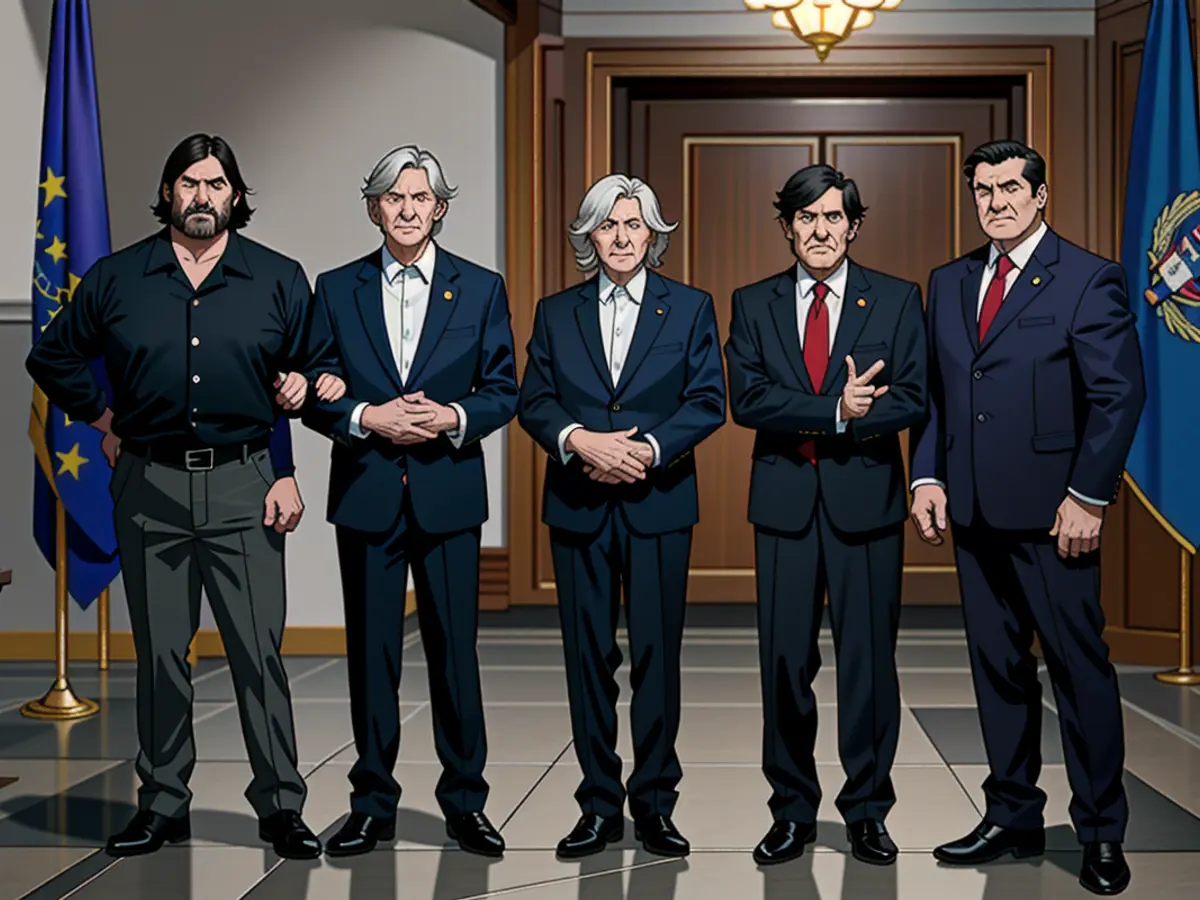Argentina's Milei garners support from Trump and Musk. Here's the outcome of his 'ruthless methodology'.
Under the leadership of the liberated fiscal conservative, the government has witnessed extraordinary monthly budget surpluses and notable decreases in inflation, termed as "outstanding accomplishments" by the International Monetary Fund.
Entrepreneurs have acknowledged these changes with exhilaration: Argentina's primary stock index, Merval, has escalated approximately 140% this year, featuring some of the nation's biggest publicly trouped corporations.
However, the country's economic situation has demanded sacrifices from the ordinary population. The poverty rate has ascended beyond 50% from an already distressing level, the economy, the third largest in Latin America, has plunged further into a recession, and joblessness is rapidly escalating.
Natalia Burone, who partakes in supplying gratis meals to 80 families in a Buenos Aires suburb, reported an increase in demand to CNN. "There's a rising desperation since many individuals lack sustenance and I can't admit any more individuals as we are at our limit,” she expressed her concerns.
The International Monetary Fund envisions Argentina's Gross Domestic Product will shrink by 3.5% this year following a 1.6% contraction in the last year. The projected growth rate of 5% in the forthcoming year is expected to only moderately offset these losses.
"In terms of inflation and fiscal stability, there's been a tremendous and extraordinary feat," announced Hans-Dieter Holtzmann, a Buenos Aires-based project director for Argentina, Brazil, Paraguay, and Uruguay at the Friedrich Naumann Foundation for Freedom, a censorship-free German think tank.
"However, the country is still in a recession and has in fact, succumbed deeper into a recession due to budget adjustments," Holtzmann clarified to CNN.
Milei, who enjoys displays of a chainsaw to represent budget decreases, has drastically diminished the number of government ministries to eight from eighteenth and dismissed over 30,000 government employees. He also annulled energy and transportation subsidies, suspended practically all public development projects, suspended most subsidies to local governments, and frozen public sphere salaries and pensions.
As a result, in November 2023, a bus ticket in Buenos Aires priced at around 70 pesos (7 cents) due to subsidies, which barely covered operational costs, let alone infrastructure financing. Transit fares have since quadrupled, claimed Holtzmann.
Though many of these modifications were imperative to curtail an expansive and ineffective state, the transformation has proven arduous for a country where approximately 10% of the population is employed in the public sector.
Regardless of the adverse outcomes of his policies, public opinion polls have demonstrated sustained approval for Milei.
Milei suggested that circumstances would worsen before they improved, and now, we're witnessing they are improving... consequently, individuals trust him," shared Matteo Maffia, a 33-year-old communications consultant from Buenos Aires' outskirts.
A decrease in price escalations has emerged as a refreshing relief for a population that has suffered inflations for years. Monthly inflation declined to 2.7% in October, from 25.5% when Milei assumed responsibility in December 2023. In contrast to yearly inflation of 211% in October, prices escalated 193% compared to a year ago.

"Previously, as soon as you received payment for a task, you'd strive to acquire as much as possible, since the peso was depreciating almost hourly,” Maffia shared with CNN. “Now, I occasionally visit shops and am surprised that prices remain steady... It feels completely new.”
This recent stability has also encouraged Maffia's business operations, resulting in longer-term contract commitments from clients. “People are planning, they are contemplating potential investments, unlike before when you primarily worked each day.”
Peso Overvalued
In parallel with repairing public finances, Milei — an anarcho-capitalist who advocates for shrinking the size of the government — has dismantled bureaucratic barriers.
During an interview on a podcast last month, he stated that his deregulation ministry eliminated up to five regulations daily.
He further revealed that ElonMusk, co-chair of Trump's Department of Government Efficiency, which focuses on reducing redundant expenses and surplus regulations, admires Milei's "chainsaw" method of administrative work and is aspiring to implement the same model in the United States.
Consequently, Musk aligns with his co-chair Vivek Ramaswamy, who wrote earlier this month in “X”: "A reasonable formula to rectify the US government: Milei-style modifications, on steroids."
Milei has also endeavored to attract additional investment, crucial for boosting economic growth.
A new law offering investment incentives, including attractive tax reductions, could potentially lure up to $50 billion in foreign investment, according to the Argentine government's quotes attributed to financial firm KNG Securities.
However, capital controls, which limit currency inflows and outflows, are causing hesitation among investors.
In addition, the government continues to dictate the exchange rate: Despite shelving Milei's election commitment to dollarize the economy, it devalued the peso by 54% against the US dollar last December and then by an additional 2% each month afterward. Nonetheless, the currency still appears overvalued, as per economists.
“One of Argentina's primary underlying issues (is) the overvalued peso, which is eroding Argentina's international market appeal,” commented Kimberley Sperrfechter, an emerging markets economist at consultancy Capital Economics, in a recent note. A weaker peso would make Argentina's exports more attractive to overseas purchasers.

"In the absence of a weaker currency, it's challenging to visualize Argentina's economy consistently expanding while preserving the advancements made in balancing public finances thus far."
An unpredictable character
Numerous international investors are holding back, awaiting clear indications of Argentina's economic transformation, before making significant long-term investments. In this aspect, Milei's erratic disposition could hinder his efforts to advance reforms through Congress, where his party does not hold a majority in either chamber.
Milei frequently criticizes both domestic and foreign politicians he perceives as advocating for a "socialist agenda." Moreover, during a recent visit to Spain, he labeled the Spanish prime minister's wife as "corrupt."
Previously, Milei also referred to Brazil's President Luiz Inacio Lula da Silva as an "angry communist," potentially damaging relations with a crucial trading partner and South America's largest economy.
"Foreign companies considering Argentina as a viable investment destination are put off by Milei's continuous diplomatic spats," remarked Holtzmann of the Friedrich Naumann Foundation in a recent observation.
Nevertheless, a groundbreaking free trade agreement with the European Union – sealed on Friday between the bloc and Argentina, Brazil, Paraguay, Uruguay, and Bolivia – could enhance Argentina's relations with its neighbors and Europe, supporting the economy.
At present, most Argentines seem willing to grant Milei the advantage of presumption.
"Initially, it was challenging to back him... but I observe that an increasing number of Argentines are recognizing his plans are successful day by day," said Flor Maffia, a retired school teacher. "There's a new wave (of optimism) in Argentina."
Similarly, Diego Fenoglio, an entrepreneur and founder of Rapanui, a chain of ice cream shops across the nation, underlines Milei's government is heading in the right direction.
"There's still a lot to accomplish, but if they continue at their present pace, this nation will bear little resemblance to what it was just a year or two ago."
Businesses are optimistic about Argentina's economic developments, as reflected in the surge of the Merval stock index by 140%. However, the country's recession and high unemployment rates have led to increased demands for free meals, as reported by Natalia Burone.
Despite the economic challenges, Argentine entrepreneurs like Diego Fenoglio have noticed a positive impact on their businesses, citing a decline in inflation and a sense of stability, which has encouraged longer-term contracts and investments.





